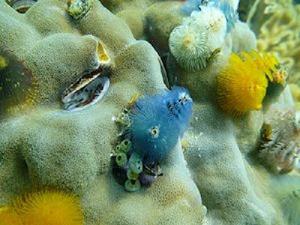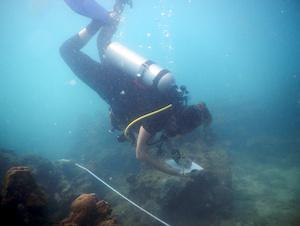Luca Budello
Other projects
23 Feb 2012
Development of a Community-Led Coral Reef Management Programme in the Koh Sdach Archipelago, Cambodia
Shallow Waters works towards the development of a community-led natural resource management plan in Koh Sdach, leading to the creation of Cambodia second Marine Protected Area.

Tree Worms on Massive Porities.
Having successfully facilitated the creation of Community Fishery Organisation during phase one of the project, Shallow Waters is now working towards building its capacity to manage natural resources. Thus, phase two of this community-led coral reef management programme has three clear areas of work:

Surveyors collecting data on coral reefs.
Research & Monitoring - To conduct a complete baseline assessment of the socio-economics of the archipelago to better understand community perceptions towards the establishment of a Locally Managed Marine Area (LMMA); household composition, access to market, diversification of livelihood, and fishery practices (i.e. gear used, fishery type, fish landing, commercial value of specific fishery etc.). Further to this, we will continue monitoring the coral reef eco-system in order to build our dataset toward a long-term monitoring programme.
Capacity Building – To train the CFO committee and other stakeholders in natural resource management in order to allow the committee to be able to manage itself.
Social Marketing – To expand the environmental education programme, and to raise awareness about key environmental issues such as pollution, illegal fishery, sustainable fishing practices and reef ecology.
The three main areas of this programme are intrinsically connected to one another, and they represent the organic development of our project. The main benefit accrued by the community as a whole will be a sense of empowerment toward realising community aspirations related to their local resources and preserving their way of life, which is currently under threat from coastal developments. In particular, 1) the socio-economic research programme will allow the baseline dataset to be compared over time against new data collected as the project progresses; 2) the capacity building component of this second phase will support the CFO committee in providing training on project management leading to the creation of a management plan for the newly created CFO; 3) the social marketing component of the project will allow the younger members of the community to develop leadership skills by taking forward awareness raising projects on key environmental issues within the community.
In order to make long-lasting contribution to the environment it is critical that the community is enabled to manage the natural resources in the area upon which they depend. By empowering the local fishers to make democratic decision on matters regarding natural resource management; by facilitating processes leading to building institutional capacity at community level; by raising awareness on the importance of developing such programmes; and by providing evidence-based recommendation to the fishery administration; we aim to assist the newly created Community Fishery Organisation in developing a natural resource management plan leading to the creation of a LMMA.
The implementation of this programme will help the community to develop sustainably; it will contribute to democratisation of decision-making processes; it will assist the national government in meeting the targets of their National Strategic Action Plan; and to protect the environment for future generations.